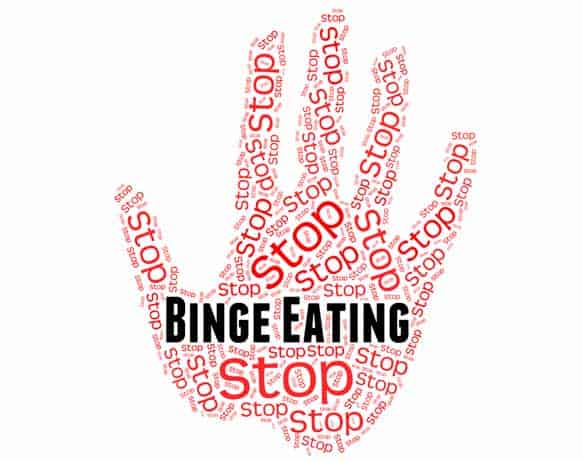Binge eating is a very serious disorder. Someone who has binge eating disorder will most likely be of normal weight, therefore making it hard to recognize if they have it by just looking at them. Signs and symptoms that you or someone you love have this disorder can include of the following:
- Eating a lot of food in one sitting
- Keep eating even when you are physically full
- Dieting often without losing weight
- Keeping food around you at all times
Binge eating can have vastly negative effects on your health and life. The impacts are not just physical but also emotional. Binge eating generates shame, guilt, anxiety and depression. These are emotional stressors that can cause your blood sugar levels to go awry. It also causes physical discomfort in that you may have gastrointestinal distress. Because binge eating is extremely compulsive and the person feels a loss of control, most people do it in private.
The anxiety that comes with having this disorder can cause your relationships, finances and health to be compromised. It is, therefore, very important to learn strategies and tips that can help you control your binge eating, especially if you have diabetes management to worry about. Due to the uncontrolled ups and downs of your blood sugar levels, complications related to diabetes may occur sooner rather than later.
We have sought out the expertise of professionals who share ways you can have control over this disorder.
Please read through them to learn coping mechanisms which can help you lead a life with less anxiety, shame and guilt.
[accordions id="6848"]
1. Dr. Lisa Palmer

- Awareness of How Your Mood Affects Your Food.
A lot of people don't realize that their mood affects how they eat. It's a good idea to stay away from triggers and to set boundaries in your relationships and life. Work on your mindfulness and self-awareness awareness and work on healing negative emotions. - Pay Attention to Your Food Rituals.
Pay attention to how you eat, and any food rituals you have that may cause you to eat more than you should. Some examples of food rituals are grazing throughout the day, eating slower or faster, stopping at your favorite fast food places, cutting food apart into small pieces, eating the same foods all of the time, or mixing inappropriate foods with each other. - Stop Thinking Negatively While You Eat.
If you find yourself thinking negative thoughts about yourself or your life while you eat, just stop. You need to work on changing how you are thinking. Sometimes events of the day or TV programs can really affect us and make us just want to reach for comfort food. So, always be aware of why you are wanting to eat, and think twice when you find yourself reaching for that snack after watching the evening news. - Realize That “Feeling Empty” is Emotional.
It takes our bodies about 20 minutes to feel full. But if you consistently find yourself “feeling empty” after meals than you might not be feeding yourself the right nutrients your body needs or your issue is a psychological and emotional emptiness than can never be filled by food alone. It is a good idea to seek counseling from experts who can help you change how you feel, and advise you on a good nutrition plan. - Ditch the Scale.
Stop weighing and judging yourself. This often makes people feel bad or pressured and causes them to eat more. Instead, ditch the scale. You are not defined by the scale. Focus on the positives and take one day at a time. When you are making progress you will know it and feel it. - Good Nutrition and Exercise.
A good vitamin, nutrition, and exercise plan will help you to reduce your cravings and leave you feeling more vital and recharged every day. Not to mention improving gut health is crucial to helping you improve your overall health, and produce neurotransmitters which are also very helpful in stabilizing your mood and keeping you happier and motivated. - Build Your Self-Esteem and Motivation.
Focus on what is positive about you, and work with a mental health professional or coach who can help you to stop sabotaging, and stop “stinking thinking” from holding you back. You must grow your positive beliefs about yourself and improve your confidence from within. Mind over matter. When your positive belief systems change, it's amazing how much easier it is to achieve any goals you have in mind.
2. Dr. Angela Redlak-Olcese

Binges are well understood and are maintained by a number of self perpetuating factors that lead individuals to feel stuck and helpless.
The primary risk factor for developing binge eating is triggering the starvation/deprivation pathway by restricting the overall amount eaten, limiting caloric intake below 1500 cal a day, avoiding favorite foods, and delayed eating. Individuals typically binge on favorite avoided foods. Consequently, binge eating is typically activated by strict dieting. The symptom of binge eating is common in individuals with anorexia, bulimia, and binge eating disorder. Binge eating triggers negative body image and self loathing, which fuels the motivation to continue strict dieting to feel better, which locks an individual into the cycle. Moods and events also increase the likelihood of binge eating because they take the mind off from uncomfortable thoughts and dampen down intense mood states, therefore in directly managing mood instead of learning how to directly cope with it. This is typically referred to as emotional eating.
Tips: avoid strict dieting and thinking of food as good or bad, incorporate favorite foods in moderation, avoid long delays in eating and instead eat on an interval of every 2-4 hours (3 meals 2-3 snacks daily), develop a list of coping skills to directly manage negative emotions and to surf urges to binge and practice them daily, remind yourself that urges to binge are temporary and have a beginning, middle, and end, use pro-active problem to manage upcoming events that you have previously binged at, get back on track with next meal or snack after a binge episode instead of thinking of yourself as "all good or all bad" which perpetuates passivity and allows the episode to continue, challenge the false solution of "dieting" to gain control of how you feel about your body after a binge episode because it is a "trap" and will set you back up for binge eating.
3. Kristin Fiore, Owner, E-RYT

Set yourself up for success. Often there is restriction before a binge. Try to eat smaller, more frequent meals so that you aren't feeling deprived and overly hungry when you begin eating. Enjoy food from a variety of food groups and tastes (sweet, salty, sour, savory, etc) at each meal so that you feel satisfied with the diversity of your choices instead of limited.
Hit the pause button. When you notice the urge to binge, purge, or any strong sensations or emotions, stop what you are doing and focus on the breath. Inhale for the count of your natural breath and then extend your exhalation by the count of two. Continue to count the breath as a means to stay focused on the present moment and sit with any sensations that arise. When the mind wanders, bring it gently back to the counting of your breath.
Eat slowly and mindfully. We often eat so quickly that we don't notice the feeling of fullness until we are overly full and uncomfortable. Try chewing each bite 10-30 times, put down your fork or spoon between bites, and take a few breaths before continuing.
Don't eat alone. If you are struggling with binge eating cycles, find someone you feel comfortable with and meet them for a meal. If there is a time of day or some other trigger you have identified, ask for support around this time or situation. Ultimately, we must learn to love and trust ourselves, but sometimes we need to see healthy behaviors and love modeled for us.
Remember that each moment is a new opportunity - all things arise and pass. We are not limited by choices we have made in the past or someone else's expectations. Literally stuffing yourself will not fill up the places that are hurt, scared, angry, or sad. Try activities like yoga and meditation as a means to check in with yourself regularly. We often focus on food strategies as a means to heal, but as we develop our awareness and reconnect to our body we find new pathways and build our capacity for love.
4. Amy Ornelas, RDN, CEDRD

My best advice for binge eating is not to let yourself get too hungry! Try to avoid going more than 3-4 hours without eating. Many people try to compensate for bingeing by dieting or otherwise restricting their intake on the front end, but this only causes the body to push harder to seek out more calories later on and ultimately perpetuates the bingeing cycle. Since bingeing is typically triggered by some combination of being nutritionally restricted as well as being emotionally triggered, one of the first steps to break out of this is pattern of coping involves the development of a regular, consistent eating plan.
5. Dr. Tami Brannon-Quan, PhD, MFT

Binge eating is more about emotional hunger than physical hunger. Having said that, many of the foods chosen to binge on, such as sugar and carbohydrates, create a physiological response that perpetuates the binge due to the spike and drop in blood sugar. Binge eating is often a maladaptive coping mechanism to escape emotions and attempt to soothe or comfort oneself. It is imperative in treatment that the individual identifies the triggers in which they binge over, and learn new, healthy coping mechanisms to replace the bingeing behavior. In treating any individual with an Eating Disorder, I feel it is crucial that a Registered Dietitian be a part of the treatment team, with frequent communication between therapist and dietitian to best serve the client. A dietitian can assist in creating a healthy meal plan, discussing what works and what does not, as well as accountability.
I highly recommend reading the following:
6. Elyse Resch, MS, RDN, CEDRD, Fiaedp, FADA, FAND, Nutrition Therapist

Ever wonder why it seems so easy for some people to stop eating when they're full? They seem to have no desire to eat beyond fullness, because they don't want to feel uncomfortable, and they're just basically “done” with the moment of eating. It's likely that most of these people have never held body negativity, so they have never attempted to change their bodies by going on diets, restricting certain foods or amounts of foods, or creating “good” and “bad” lists of foods. In other words, they're Intuitive Eaters.
Most people are born with all of the wisdom they need to know how to eat. They are natural Intuitive Eaters. Unfortunately, many people become disconnected from this internal wisdom. This is often a result of the culturally thin ideal, weight stigmatization, and a belief that their weight determines their value. As a result they use some of the behaviors listed above, which frequently result in binge eating.
In order to prevent or heal binge eating, it is important to follow these basic tips, which will not only erase binge eating but also reconnect you with your innate Intuitive Eater:
- Reject the diet mentality — diets don't work—don't waste your time, money, or self-esteem on them.
- Make peace with food — make all foods emotionally equivalent—no more good foods, bad foods, restrictive eating, or judgment about the foods you eat.
- Find satisfaction in eating — if your goal is finding pleasure in eating, then you'll begin eating when comfortably hungry (not ravenous), stop eating when comfortably full, and eat foods that you truly enjoy.
- Learn to cope with emotions without restricting or using food
- Respect your body — treat it well with positive self-talk and nurturing activities.
- Put movement back into your life — not exercise for the purpose of weight loss, but movement and activity in order to feel good, both physically and mentally.
As an Intuitive Eater, you will feel the freedom that comes with it and the safety to know when to eat, what to eat, and how much to eat.
Just watch your binge eating, as it leaves your life for good!
7. Robyn L. Goldberg, RDN, CEDRD Nutrition Therapist

In the twenty years of my experience as a Nutrition Therapist who specializes in working with people who struggle with all types of eating disorders, I have realized that many people are not aware that binge eating disorder is the number one eating disorder for people with eating disorders. 60% of women and 40% of men struggle with it. People who suffer from BED come in all shapes and sizes. It's a myth that an individual who has BED is of a larger size.
- Many people have various food rules and the long-term goal is to help them give permission to consume foods that they may have labeled as forbidden. It is important for clients to “legalize” those foods that they have seen as taboo. I called it the “Neutralize & Legalize” of food.
- My long-term goal is to have clients learn how to have a normal relationship with all foods. People attach feelings and emotions to certain foods that they associate with binge eating. They learn to consume those foods without emotions leading them to consume those foods.
- Next, we work on replacing shame with successes. There is a lot of shame associated with food which leads people to sneaking food, eating fast food, which in turn makes them feel guilty. I like to help clients focus on their victories rather than shame.
- Lastly, it is important that my clients understand and promote self- care & self-love. This is an important topic because people do not know how to work on self-care since our culture does not emphasize the importance of working on the inside.
I suggest that clients who struggle with BED work with a team who is HAES savvy (Health at Every Size).The team can help them in journey of a healthy relationship with food.
I suggest that clients who struggle with BED work with a team who is HAES savvy (Health at Every Size) who can help them begin working on their relationship with food.
8. Emmy Brunner, Founder & Director of The Recover Clinic

Binge Eating Disorder is an illness that affects millions of people, and can have a devastating effect on a sufferer's physical and emotional wellbeing.
It's common for people suffering with Binge Eating Disorder to feel a lot of shame and guilt towards their relationship with food. As such, one of the ways we support recovery and a more intuitive relationship with food is by introducing the concept of “mindful eating”.
Eating mindfully means eating with purpose, presence, intention and attention: the purpose and intention of doing something good and enjoyable for yourself, and the presence and attention (awareness) of how your body and mind are experiencing it.
This process starts before you sit down in front of your food - it starts by being aware of why you want to eat. Some of the questions that can support mindfulness while eating include: Am I eating because I am hungry? Because “it's lunch time”? Because there is an uncomfortable emotion that I am trying to avoid? Because it is a nice way to enjoy sharing time with someone? And while you are experiencing this physical aspect of the food, ask yourself: What am I thinking? Am I emotionally engaging with what I am thinking?
By developing an awareness of the emotional relationship to eating, the individual simultaneously develops an understanding of how binge eating has served a purpose to cope with painful emotions. Being mindful can help remove the shame and guilt associated with binge eating, allowing headspace to focus on other ways to process these hard emotions, such as: journaling, writing daily affirmations and meditating.
9. Ashley Palatiello, RDN, CEDRD

In order to help clients stop binging, I usually first recommend eating a meal or a snack every three to four hours. Many times people get in the habit of trying to limit how much they eat in the morning or early afternoon, which will then likely lead to overeating at night. In fact, I find that the more calories people consume before the early afternoon, the less likely they will be to overeat at night. The balance of the foods that they are eating are also important. It is important to always have a good source of carbohydrate, protein, and fat at meals and snacks in order to promote satiety. Finally, another tip that I find is helpful for most clients, is turning off the tv and sitting down at the table to eat all meals and snacks. This can help us be more mindful and taste the food more, which will help us listen to our fullness cues more than when we eat when we are distracted
10. Dr. Judy Scheel, Ph.D., LCSW, CEDS

- Recognize the early and very early warning signs; the decision to binge eat starts long before the person heads to the pantry or refrigerator.
Some call it "triggers," but sometimes the triggers are not so obvious. If sadness or loneliness are potential reasons to eat, do not dismiss seemingly unrelated situations or events in the day that induce these feelings i.e. learning of a friend's engagement or pregnancy. Allowing time to feel sad or lonely is appropriate; eating to fill that emotional time is a response, but one that only camoplagues or temporarily soothes. The more comfortable a person is with difficult emotions the easier they are to tolerate in a pure state without the need to turn to symptoms like food. - Plan a binge.
If a person typically binges on 5,000 calories, then plan a less than 5,000 calorie binge. Look to reduce quantity over time with subsequent binges. Take a look at the food that will be ingested. Notice what feelings emerge. - Commit to waiting 15 minutes before a binge episode begins.
Notice feelings during this time. The food will be there 15 minutes later. Perhaps less food can be eaten if 15 minutes are spent on self-reflection or tuning in to the reasons, or feelings the binge is necessary. - Accept that to binge or not to binge is in one's control.
We make decisions all day long. One decision is to binge. When someone says they are out of control with eating, the reality is that what is precipitating the binge is what is feels out of control in life or in their emotions typically. Feelings ought to be out of our control; they are feelings. Behaviors are in our control. It often feels like it is easier to binge than to feel. Symptoms too often are preferable to feelings.
11. Emily Betros, LMSW

- Give yourself unconditional permission to eat – The moment you tell yourself you can't have something, you set yourself up for a potential binge. Let go of the diet mentality and get to a place where you can trust yourself to eat whatever nourishes you. There are no “good” or “bad” foods.
- Practice Mindful Eating – When eating, use all your senses. What does the food look like, smell like, feel like? Are you distracted or focused on the meal? Who's with you? During your meal, consider if the food is still satisfying you. Are you ready to move on to a different dish? Are you starting to feel full? Does it still taste just as good as when you started eating? Slow down and give attention to your meal time.
- Find a stress reliever – The emotional connection to food is powerful. For some, this results in binge eating. If stress, anxiety, sadness, etc is leading you to binge eat, then start with what you can do to relieve or work through those feelings.
- Have a plan – It's hard to know what do to when you're in the beginning, middle, or end of a binge. However, if you've put together strategies to distract, calm, sooth, or relax yourself, you can use this when you are experiencing a binge. For example, “When I'm stressed, I'm going to call a friend”.
- Have a mantra – Having a phrase or statement that shows love and compassion for yourself even in the hardest moments can be really powerful. This could be as simple as, “I'm committed to listening to what my body needs” or “I'm worth it”.
- Eat when you are hungry – This can be tough as many people who binge have lost touch with the sensation of hunger. It's important to get back in touch with and honor that natural feeling of hunger. When you feel hungry, eat something. Pause. See if you would like more, and then decide if you'd like to continue eating or not.
12. Amanda (Buller) Holben MS, RD, LD

Overcoming binge eating behaviors can feel like a daunting task. However, disrupting binge eating patterns is possible and there are tools and tips that can help those who struggle. For those who are struggle with Binge Eating Disorder, the help and support of a multidisciplinary team of eating disorder specialists is recommended for full recovery.
Many binge eating behaviors result from dietary restriction of some kind. Therefore, it is important to eat satisfying food options consistently throughout the day to prevent binge urges from developing. Pairing carbohydrates with proteins and/or fats at meal and snack times can be particularly helpful in preventing binge urges. For those who binge to numb or avoid emotions, it is important to develop healthier coping techniques. For example, reading or journaling may help to avoid the emotional drive to binge eat. Dieting for weight loss is a common trigger for binge behaviors and, therefore, is likely to worsen behaviors, not improve them. Similarly, “saving up” food for the end of the day or the end of the week is a common trigger for binge behavior. Eating moderate portions of enjoyed foods throughout the day will prevent binge urges in the evening hours. Labeling food as “good or bad” is likely to trigger binge urges; instead, incorporate all foods with balance, variety, and moderation to feel satisfied and reduce the drive to binge.
13. Erica L. Branz MS, RD, LD, CEDRD

Recovery from Binge Eating Disorder (BED) can be an emotional and physical rollercoaster for the individual suffer. What many people think who are struggling with BED and wanting freedom from the behaviors is to follow more strict guidelines or rules regarding their food intake. One may feel they should only consume “good” or “healthy” food to end the binging behaviors and then failing when they consuming that one “bad” or “unhealthy” food spiraling them into a full binge eating episode restarting the cycle again.
Another diet is not the answer to recovery from BED. Working with a dietitian and team that specializes in binge eating, compulsive overeating, or eating disorders in general is you first step. The goal is to neutralize all food groups getting rid of the stigma that foods are “good" or “bad" and working towards intuitive eating again to rebuild trust in food. Binge eating did not develop overnight and will not get better overnight either. It’s a life style change that takes time, not a quick fix.
14. Dr. Jennifer D. Lundgren, PhD, FAED

- Begin a regular eating schedule and keep a food record to help you learn about your eating patterns. For example, do you wait too long to eat or do you skip meals? Meal skipping and waiting too long to eat are common triggers for binge eating.
- Begin to document your emotions and thoughts before and during binge eating episodes. Notice patterns such as commonly eating in response to certain mood states or interpersonal stressors. Develop alternative coping strategies or work with a profession to help you identify alternative strategies for dealing with mood, anxiety, and stress.
- Do not attempt to compensate for binge eating by caloric restriction or purging—research has demonstrated time and again that compensatory behaviors are NOT effective and can be very dangerous, even lethal. In my clinical experience, attempts to compensate (e.g., meal skipping) often lead to even greater caloric consumption in the future, having the opposite effect than what was intended.
- Practice mindful eating. The practice of mindful eating can help you slow down your eating behavior and identify feelings of hunger and fullness. There are several online mindful eating guides, but I recommend work by Lynn Rossy: http://lynnrossy.com/
15. Libby Parker, RD

My top strategy for people who binge eat is to really ask yourself what is the purpose behind the eating? Binge eating (or any type of eating disorder for that matter) is not about the food. binge eating is using food as a way to cope with an emotion or situation that the person does not want to fully be present in. It can be used to numb-out or distract from being uncomfortable.
If you ask yourself what the emotion is that you are avoiding you can choose a more productive way to deal with it. For example: if you are lonely, find someone to talk to even if it is on the phone or facebook chat. If you are angry, hit a pillow, go for a run, or write a note with all those feelings. Use an appropriate activity for the feeling. If it is something that comes up frequently, you will need to get to the root of the problem to make the need to cope go away. If you are lonely because you just moved and don't know anyone, find a meet-up group that interests you and meet new friends. If you are unsure of how to deal with the larger problem, find a licensed therapist to help you navigate the difficulties.
Binge eating can also turn into a habit. Our stomach has a wonderful ability to stretch up to a liter in capacity, and where it hangs out normally depends on the typical size of the meals consumed. So if you are eating large portions on a regular basis it takes more food to feel full than someone who eats smaller portions on a regular basis. Unfortunately, this is where planning and willpower come into play. If you have taught yourself to eat large amounts of food, you will need to consciously make an effort to eat a few bites less than normal until you are comfortably eating your correct portion. This will take time, and a crash-diet is not the way to get there. Tell yourself you can do it, and know why it is important to you to get your eating back in control. I believe in you!
16. Dr. Charles Fishman, MD New Zealand Eating Disorder specialists

Eating problems have less to do with food and more to do with Relationships. Address unresolved conflicts with close relationships, especially. The body says what the mouth won't!
17. Marjorie Nolan Cohn, MS, RDN, CEDRD, CSSD

I think it's important to not minimize binge eating, and acknowledge that Binge Eating Disorder (BED) is a severe mental illness that warrants deeper therapeutic treatment. I've worked with a lot of clients struggling with BED who have been advised, or think that going on a diet is the solution. If someone feels out of control when eating, eats large quantities, and has significant guilt or shame afterwards then my most important tip is to seek help. Schedule an appointment with a Therapist and/or Registered Dietitian that is certified in the treatment of eating disorders.
18. Casey Bonano RD, LD, CEDRD

I encourage my patients to eat every 3-5 hours. Eating more often allows the metabolism to reignite every couple of hours, achieving a greater metabolic burn through out the day. It also gives the patient permission to eat again in a couple of hours, which helps interrupt the deprivation/binge cycle. In addition to eating more often, I encourage my patients to combine macronutrients. Meals need to include carbohydrate, dietary fat, and protein. Our macronutrients are meant to work together to get the optimal energy and satisfaction from our food.
19. Jerry L. Law, D. Min., MDAAC, CIP

In 2013, The American Psychiatric Association published the Diagnostic and Statistical Manual of Mental Disorders Volume Five. In this update, the AMA formally recognized Binge Eating Disorder as a bonafide condition than can be successfully treated using several therapeutic modalities. Many individuals who binge eat do not meet this diagnostic criteria and the purpose of this article is to offer some practical tips and strategies for dealing with the cravings and impulses individuals often face when it comes to the occasional desire to binge or overeat. If you or your loved one are facing true Binge Eating Disorder, you are advised to seek guidance from a physician, registered dietician and/or other healthcare professional trained in the diagnosis and treatment of this disorder.
For those struggling with a frequent or not so frequent urge to binge, here are a few ideas you may find helpful:
- Create a “trigger log.” For a week or two, keep pen and paper nearby. When confronted by an urge to binge, jot down some pertinent facts such as time of day, your physical location, what emotions and or stressors are you facing, the environment (i.e. are you alone or with a group), etc. Look for trends. Do you recognize any? Can you change any of these? What other coping mechanisms can you use rather than eating? What healthy boundaries can you put in place?
- Practice mindful eating. Dr. Michelle May's book, Eat What You Love, Love What You Eat can be a powerful source of inspiration as well as a practical guide to the concept of mindful eating and the successful management of hunger cues. I've known a number of individuals who have successfully overcome binge eating through this practice.
- Cognitive Behavioral Therapy (CBT) is another type of counseling you may find helpful. Dr. Daniel Amen's work here is particularly valuable. His books, change Your Brain Change Your Life and The Brain Warrior's Way Cookbook are filled with cutting edge research and concepts that can help you retrain your brain in ways that lead to healthy, happy eating. Visit his website at www.danielamanmd.com for more information. If you have a therapist trained in CBT, I encourage you to reach out to that professional for help as well.
- Getting to the bottom of what may be at the root of your binge eating is critical. Perhaps trauma, PTSD, or chronic depression are underlying causes. Stepping back from the moment when a binge eating crisis presents itself and taking an honest look at your life and history can in and of itself be quite helpful. Taking a time out for meditation, yoga, tai chi or other body centric practices may be just what you need in redirection.
Once again, binge eating is not to be taken lightly and if you fear that your experiences with this behavior have reached critical mass, contact a health care professional for a comprehensive evaluation. For those who face this issue less frequently but are ready for change, trying the ideas presented here may be very helpful.
20. Shallah Panjwani, BSc., RD

These are some tips/strategies for people that binge eat:
- to use structured eating to normalize food intake
- to create healthier eating behaviors
- to develop a healthy, lifelong relationship with food
- to learn how to easily maintain a healthy weight for life.
- to reduce concern about body weight and shape.
Nutrition education introduces a fundamental understanding of what macronutrients (carbohydrates, proteins and fats) are and what proportion of each is required for one’s body needs. It is important to understand what metabolic rate is and what the effects of restricting, binging, purging and yo -yo dieting are on metabolism. Identifying negative beliefs surrounding food, weight and body issues is imperative in understanding what leads to disordered behaviors. Clients must learn how to recognize hunger and fullness cues. Also, structured meal plans will help appropriately demonstrate what calories should look like using food groups and proper portion sizes. Client must build a meal plan incorporating all the food groups based on their individual bodys’ needs. Through nutritional coaching, clients should overcome the challenges of eating food in a social environment. Portion size education, how to eat in a balanced way incorporating all the food groups as well as having lists of various options to help expand one’s food repertoire is all necessary for nutritional adequacy.
A specific eating plan would be to eat three meals and two to three snacks per day incorporating four food groups per meal and at least two different food groups per snack. The purpose of the meal plan should be to provide adequate energy and nutrients to enhance the client’s metabolic system. I would calculate their caloric needs based on the Harris Benedict equation. The eventual goal is to remove dependency from the meal plan all together and ensure that he or she is ready to shift from structured eating to internal self-regulation or intuitive eating. I would also recommend that he ingest at least 2 L per day of water to prevent dehydration.
21. Maria Sorbara Mora, MS, RD, CEDRD, PYRT, RYT

- Safety in Structure - Without walls even the strongest of buildings would collapse. Structured eating means eating within safe limits. When too many hours lapse between meals and snacks overeating becomes an unfortunate consequence. Be sure to eat within the first hour of waking and then every 3-4 hours after to ensure steady blood sugar levels. Eating balanced is also a must. Calorie restricting or eliminating fats or carbs encourages binge, compulsive or overeating by ways of depriving the body of its basic needs. Eating a balanced diet of wholesome grains, lean proteins, essential fats, fruits and vegetables promotes fullness, satiety and enjoyment of the meal and fights against overeating.
- Invite Your Senses to the Table - Mindful practices are one of the best ways to discourage emotional, compulsive or binge eating tendencies. Use your five basic senses when initiating a meal and watch your experience unfold. What does the food you are about to eat look like, feel like, smell like, sound like and taste like? When your senses are present, so are you. Also consider your pace. When you're eating mindfully you tend to slow down the pace of eating as well. The more slowly and mindfully one eats the easier it is to get a genuine satiation cue telling the body when it has had enough. Awareness is the most important part of meal so don't forget it.
- Learn to Surf - Riding the wave of a craving can be the most important skill a binge eater ever learns. Putting space and time between cravings can create a sense of empowerment and strengthen the muscle of tolerance. Delay tactics can be critical to learning how to manage a binge urge. Next time a craving hits, see what it's like to add an activities such as taking a shower, going for a walk or listening to your favorite tune. When some time passes, reassess the craving. Has it subsided? When the wave of craving hits does it crash down on you or do you take out your board and surf the wave?
- Write your Heart Out - For a binge eater, food is the means of communications for feelings or emotions. Food is sometimes used in these cases to soothe, numb or repress feelings. Journaling can be a canvas to paint these important feelings on to. Food logs can be one such tool for awareness. It is not only a way to have meals and snacks accounted for. In addition to what, when and how much you've eaten, food logs record hunger and satiety, where the meal has taken place and any feelings or emotions present. These are important facts that can help establish eating patterns. For instance, you may realize the majority of your meals occur at home, alone in front of the TV. You may then notice that the impetus to eat time and time again is loneliness. Being able to be this up close and personal with eating behaviors ensures a way to open up to the real reasons you're eating.
22. Lyn Goldring, RN, BN, CEDRN

Binge eating disorder, newly recognized by the DSM 5 is no different than any other eating disorder and what's imperative is that we treat it as such in that we need to work on changing the client's relationship with food. We believe that placing a person on a reduced caloric diet works against the fundamental basic needs for recovery and a promotion of healing for the body and mind. There is a built in bias in our culture towards people that suffer with binge eating disorder. Many assumptions are made about the person's choices and lifestyle. Healthcare professionals often times because of the weight bias will prescribe, diagnose and promote restrictions that in fact fuel the eating disorder. We have to therefore “unpack” with the client the plethora of incorrect information and diagnosis that results and keeps them attached to the binge eating disorder.
23. Allison Cohan, LCSW

Binge eating can be tricky to identify. There are individuals whose binge eating behavior constitutes Binge Eating Disorder, and then there are many more individuals for whom binge eating is a normal occurrence, but does not necessarily meet diagnostic criteria. Some individuals who binge eat are in larger bodies, some individuals who binge eat are not and some individuals who are in larger bodies have never struggled with binge eating whatsoever. It is not an issue that can be assumed just from someone's physical presentation. My experience with individuals who binge eat has largely been those who meet that diagnostic criteria and so they are coming to see me for identified eating disorder help. However, the themes that I find apply to them, are widely universal.
The first issue we address with binging, is whether or not there is restriction happening at the other end. Deprivation is a sure fire way towards the path of binging. When there are foods that are limited, restricted, or labeled as "bad," or "guilty pleasures," we fixate on them more, not less. The greatest asset against binge behaviors is variety and freedom with foods in a way that supports overall health but takes away the energy from things previously forbidden.
The second thing we look at is underlying emotional needs. Food is a natural way we seek comfort, but there are many other ways to do this as well that are sometimes more direct. Knowing what these options are for us as unique individuals allows us to make an informed decision of when we choose food for comfort, and when we may choose something else. What is the emotion in play at the time a craving or an urge to binge arises? Are we bored? Are we lonely? Are we anxious? Are we disconnected and numb?
Our gastrointestinal system is so tightly linked with our emotional processes that the two often play off each other without our even noticing. In that moment, taking the time to pause and identify the emotional need is incredibly helpful. Then the goal is to decide how best to meet that need, and only then reassess that craving and urge. If we are bored, can we engage in something distracting other than food? If we are lonely, can we reach out to a friend, rather than seeking food as distraction that never comes back to that need? Making sure our nutritional needs are met in concert with emotional needs allows us a more even footing from which to assess whether or not the urge to binge is one we say yes or no to. Ultimately, having the awareness to make an informed choice, brings us to a place of empowerment over our health and well-being.
24. Rebecca McConville, MS, RD, LS, CSSD

The Pivot Point.
As an eating disorder dietitian who previously worked in a Diabetes clinic the philosophy of treatment is rather similar. When I treat individuals with binge eating we focus on treatment being like a teeter-totter. You won't always be perfectly situated on the board but we are continually striving for balance.
Within my role as the dietitian, the first thing I look to guide clients on is how often to fuel their body knowing that the body prefers consistent fueling. Research has demonstrated that this helps control release of hunger hormones as well as not overwhelming the pancreas to produce insulin.
The next part of balance is the fuel within each meal. Macronutrients serve a vital role in health. When an individual either intentionally restricts or doesn't plan for balance the body can become deplete in valuable nutrients generally resulting in cravings for that nutrient. Example, if one if trying to eat low carbohydrate but finds themselves with intense cravings by dinner time this is the body's way of responding to what it needs. However, this unbalanced intake can lead to the potential of a binge secondary to the physiological demand. On the other side of the teeter-totter is overwhelming the body of fuel it is not needing at that moment. This can lead to changes in the neuroendocrine response and the body may try to unfavorably respond to accommodate leading to inflammation, & weight changes.
The last part that I see as the most critical part (pivot point) is the balance in life. We all too well know that many times the previous two behaviors result due to an imbalance in our day to day life. This imbalance leads to confusing bodily messages as to what our body needs and wants. Over time some might feel an eventual disconnection.Self-care musts require a balance in: nourishment, exercise/movement, sleep and stress management. Without these you might find your teeter-totter on the ground.
25. Dana Magee RDN, LDN, CLT

- Eat regularly throughout the day.
It is important to keep your hunger and blood sugars stable throughout the day in order to keep your energy and mood on an even keel. You can do this by eating every 3-4 hours. Keep meals balanced with macronutrients of carbohydrate combined with fat and protein to feel energized and satisfied through the day. Feeling low energy or low mood can be a catalyst to a binge. - Incorporate foods you enjoy.
Restriction can also be a trigger a to a binge. Restricting your intake during the day from foods or food groups can set you up for a binge later in the day. Likewise eating "clean" or under-eating through the week can set up for a binge on the weekends. Working with a dietitian to include foods you enjoy in moderation and balanced eating can take away the deprivation and stop the cycle. - Understand the binge.
Binge eating can often feel "good" in the moment, but is quickly followed up by emotional and/or physical distress of overeating. You do not have to go at it alone. Telling your story and work with a dietitian and a therapist to help you take charge of the eating disorder, end the guilt and shame, and feel empowered. Your team can help you identify triggers and set up your environment for success.
26. Christina Gaunce, RDN, CEDRD

As with all disordered eating behaviors, the roots and resolutions of binge eating may be about the food or not at all about the food. Here are a few tips and strategies to prevent or decrease binge eating episodes:
- Meet the body's nutritional needs through-out the day. Skipping a meal or snack, dieting, ignoring hunger signals, eliminating or limiting food groups, fasting, etc. are all different forms of depriving the body. Nutrition restriction often leads to heightened cravings, preoccupation with food, a rapid eating pace, feeling out of control, and/or eating past fullness at the next eating time.
If a weight concern has developed as a result of binge eating, the focus needs to be on resolving binge eating and the development of consistent eating patterns. Focusing on losing weight will most-likely only exacerbate the binge eating behavior. - Pause and tune into your feelings and emotions. Binge eating is an unhealthy way of coping with various human emotions. Slowing down and taking the time to identify feelings and emotions through-out the day can help someone identify which emotions or experiences might be at the root of binge eating episodes.
- Stay present while eating. It is important to limit distractions when trying to decrease binge eating behavior. Turning off the TV, plating all meals and snacks, eating while seated, and taking deep breaths throughout can all help someone pay more attention their experience, the food, and decrease the chances of eating on autopilot.
- Find a specialist. Seeking support and guidance from a Registered Dietitian or Licensed Therapist that specializes in Eating Disorders will give someone the best chance to fully resolve binge eating behaviors and create healthy dynamics with food.
27. Julie Duffy Dillon MS, RD, NCC, LDN, CEDRD

Every binge begins with shame and not eating enough earlier in the day. The best way to stop bingeing is to stop dieting and stop trying to to trick your hunger. Hunger can be trusted and is very important to help your body regulate blood sugar and insulin levels.
You can also move away from binges by being more compassionate and respectful to your thoughts, feelings, and experiences. Feel like a failure? Remember there are no perfect eaters and you don't have to be a perfect eater anyway to manage diabetes well. Thinking you have to only eat healthy will set you up to fail because it is impossible.
I encourage those who binge eat to take a step back. How often do you attend to your self-care? How often do you pause to eat? Start by keeping track with an "X" how often you eat each day. Don't note what you eat or how much just when you eat. Aim to see that "X" at least 3 times per day if not more. Eating with more frequency and with less distractions will help your cravings to binge subside and easier to manage.
Binge eating disorder on average takes 7 to 14 years to recover from so be extra compassionate with yourself. Why does it take so long? We live in a world where dieting and overexercising is considered normal and health promoting when those are the very things that make binge eating worse. Even more, if you are a person of size and struggle with binge eating you are encouraged constantly to lose weight. To binge less, one needs to put weight loss on the back burner and consider forgoing it altogether. Weight does not equal health so focusing on self-care, attending to hunger cues, and working toward self-acceptance will promote long term health and less bingeing.
28. Christie Caggiani, RDN, LDN, CEDRD

- Stop dieting! Restriction is the biggest set-up to overeating or binge eating later in the day. Avoid the scale.
- Start with breakfast, within the first hour or so after waking. Continue to eat every ~3-4 hours during the day.
- Breathe before eating. Pause, close your eyes if you're comfortable, take 2 or 3 deep, cleansing breaths.
- Connect with physical sensations of hunger. If you aren't clear of your physical hunger signals, continue to practice eating breakfast and re-fuel every 3-4 hours throughout your waking hours to allow your physical signals of hunger to return. When we aren't eating regularly, it's as if the sensor in our gas tank has disconnected from the gas gauge: we are out of gas, but we just don't feel it. Our bodies, just like our cars, simply can't run off fumes no matter how much we wish it to be so.
- Give yourself permission to eat and eat what you truly want, turning your attention to the flavors, textures, temperature, colors of the food. Remove distractions like technology, and tune into the experience of eating.
- Sit, chew, taste, savor, enjoy, pause – whenever & whatever we choose to eat.
- Include real food – carbs, protein & fats at all meals and combination foods at snacks (i.e., apple and peanut butter, rather than just an apple). Eating “fake” or diet food only leaves our bodies and brains confused, unsatisfied, and looking for more satisfying food – now or later.
29. Dr. Karin Lawson, PsyD, CEDS, RYT

Strategies for binge eating:
Support, support, support!
A multidisciplinary non-weight stigmatizing team (physician, nutritionist, psychotherapist) is highly recommended. If you find one caring supportive team member, then they should likely have resources to connect you to the other components of the team.
Support group or group therapy can be incredibly validating, as many people often struggle with shame around binge eating. The antidote to shame is to put it out into the light, not keep secrets and not be alone with it.
Online support groups are a good alternative as well if you live in a rural area or have limited resources available.
One of my go-to resources is the Binge Eating Disorder Association (BEDA). Their annual conference is open to the general public and they list healthcare providers on their website who are compassionate and educated in helping people with binge eating patterns. Check https://bedaonline.com/
Binge eating, as with any life-interfering behavior, is a survival strategy that helps people manage with difficult situations, people and experiences. It serves to soothe, distract, and numb a person both physiologically and emotionally. Because of our weight-stigmatizing society, many people feel great shame around this behavior and tend to have restrictive eating patterns, which then only serves to deprive a person and perpetuate the cycle.
30. Deanne Jade

Please bear in mind that these tips probably need to be taught by an expert because there is much more to the treatment of binge eating than I can give in top tips:
- Avoid alcohol
- Keep blood sugar stable for a while, highs and lows promote excessive eating (may need guidance and advice on this)
- Try to give up dieting if you binge eat seriously, and eat a nutritionally dense diet which will reduce your impulses and your compulsions
- Learn how to manage stress with breath work or relaxation
- Learn how to say how you feel so that you don't “eat your day” or “swallow your feelings. If you are afraid to say what you feel in case you are rejected then you may need additional help to build your emotional resilience.
- Learn when you are genuinely hungry and when your cravings are emotional, so don't let yourself get too hungry. If there is an emotion underneath try to discover what it really is- Angry? Lonely? Tired? Sad? Disappointed? Disconnected?
- Look at the thinking that fosters binge eating, it could be simply having the wrong information on what you should eat or how to control your weight. It could be too many rules against which you are rebelling or too much black and white thinking about foods, good and bad foods, safe and unsafe foods. If you have a binge eating mindset you may need some help to think more helpfully so that your thinking does not provoke overeating.
- If you have a lot of I've blown it thoughts if you break your dietary rules, this will escalate. So learn how to think of lapses as learning events and be kind to yourself. Beating yourself up after binges just leads to more binges. Building self-worth helps protect against binge eating because you will be more able to take care of yourself with food.
- Take gentle exercise, walking helps reduce stress and reduces binge eating at times of stress
- Don't engage in battles between “I want and I shouldn't”. Take a deep breath and tell yourself you can have what you like – tomorrow. Or if you are arguing yourself to have an apple when you would prefer a biscuit, have a little of both.
- Have you had a very unpleasant event in your life? The binge eating might be a response to trauma and trauma therapy can help faster than you think.
- If the binge eating is serious and rules your life, get help from an eating disorder specialist, binge eating can be easily treated with the right kind of help. We have a top tips for choosing the right therapist on the information section of our website
31. Shawna Scott, MMFT, LPC / Tapestry Clinical Director

Binge Eating Disorder (BED) is the most common eating disorder in the United States. My first encouragement tip is for you to learn that you are not alone. This diagnosis has been proven to impact individuals of all ages, socio-economic levels, and races. We have estimated that roughly 3.5% of women and 2% of men have clinical symptomology that would determine a BED diagnosis. Moreover, 30% to 40% of those joining weight loss treatment programs also present as able to be clinically diagnosed with binge eating disorder.
A second tip would be to not stay in secretive isolation. There are several levels of treatment ranging from residential to outpatient care. Experiencing healing and insight can begin with a phone call to a treatment facility like Tapestry (tapestrync.com) or contact a CEDS/CEDRN certified therapist or Nutritionist that can guide you to a level of care that fits your needs. There are several online websites that can also help you to learn more about the diagnosis and assist in finding treatment providers closest to you: bedaonline.com or nationaleatingdisorders.org.
A final tip would be to let you know that while in treatment you would build behavior tools with your treatment team similar to T.I.C.K.E.T. This acronym tool was developed and shared by Dr. Hilda Lee in her autobiography “In the Labyrinth of Binge Eating.” T.I.C.K.E.T is a tool that is practiced in times of calm to be used when an urge to binge starts to overtake you.
- T stands for Touch – in the moment, stop and either notice something that you are touching or reach out and touch an object in your immediate vicinity (this begins the grounding process)
- I stands for Inhale – breath in and focus on the air coming into your body (this provides some space to slow down, even if just for a moment – you may have to take a couple of breath)
- C stands for Change. Dr. Lee shares examples of crossing or uncrossing your legs, moving locations in the room, or if you're in the car changing the radio station (just let your body/mind be distracted for a brief second)
- K stands for Know. Allow yourself to know and name that you are experiencing an urge or a craving (for some, the ambiguity is what gives the experience more power. Naming it calls it out for what it is)
- E stands for Enter. Purposefully enter the urge to binge. Sit in the feeling without acting on it. Dr. Lee explains, if you can't “conceive of not eating, tell [yourself] to calm down enough to actually taste the food…give [yourself] permission to eat, but only after the craving has passed.” She also shared that this is often the behavior that takes the most practice.
- T stands for Tolerate. It is important to stay in the state of discomfort for a time. Allowing yourself to look for the calm in the storm of an urge, and not acting on it, builds the realization that despite the difficulty, you can survive the overwhelming experience and have balance over the craving.
My desire is that these tips bring hope as you seek understanding about your relationship with food and your soul. In your efforts, know that there is support and a treatment team that can help you develop the balance that you are seeking.
32. Jacquelyn Ekern, MS, LPC

Binge eating is often used to cope with unwanted feelings, past trauma, or a variety of other triggers. Here are some tips on how to address your bingeing and make peace with food.
- Get to the root of why you binge. Understanding what triggers your binge episodes can help you see the warning signs and address underlying issues head on.
- Eat mindfully. Check in with your hunger and fullness when you sit down to the table to avoid bingeing at mealtime. If you feel urges to binge at odd hours, stop and take a moment of mindfulness to assess why. Be prepared with healthy coping tools you can turn to instead.
- Connect with a professional. Speaking with an eating disorder specialist can be extremely helpful in addressing binge episodes, triggers, and how to develop a healthy relationship with food and your body.
33. Debora A. Frisk, MS, RD

Treatment of Binge Eating Disorder (BED) is best addressed via a multi-discipline team approach to include a medical provider, behavior therapist and Registered Dietitian (RD) who all specialize in eating disorders. RDs work with clients to identify and address triggers of binge eating and to help develop alternate behaviors, distractions. Exs: adult coloring books, crafts, drawing, music, journal entries.
Nutrition Goals:
- Work to reduce, avoid binge eating episodes
- Identify hunger/satiety cues. Ex: hunger/satiety scale recognizing signs of hunger (stomach growling, feeling cranky, irritable, light headed, headache)
- 3 Meals + 2-3 snacks per day to stabilize blood glucose level, minimize cravings Using a meal plan is often helpful to practice balanced eating
- Combine protein with carbohydrate for snacks Collaborate with the client for food item
- Adequate fluid intake
- Allow adequate time to eat, enjoy food items
There is no perfect eating and recovery can be a prolonged course with relapses expected but continued practice with normal eating will help to build confidence for the client.
34. Judith Banker

Binge eating can happen for a variety of reasons—emotional, physiological, and environmental. When it occurs as a mild pattern of occasional overeating followed by an easy transition back into a naturally regulated eating pattern, it is not cause for concern. The best approach in this case, is to “let it go”. Avoid criticizing yourself for this normal behavior and avoid going out of your way to compensate for it by heading to the gym or purposely restricting your food intake. Simply return to your regular eating/activity habits. Move on.
Efforts to over-compensate for the occasional binge can actually worsen the pattern of binge eating and can even result in a clinical level eating disorder. Dieting, over-hunger, and focusing on weight loss can trigger what I call the “famine response”. Our metabolic rate slows, our brain begins focusing on finding food 24/7, and we are signaled to binge eat whenever we have access to food. This is a strong, survival-level physiological response. We can quickly get caught in a war with our own bodies---binge eating and restricting replaces our normal, regulated eating pattern. This is a particularly complicated and devastating pattern for individuals with diabetes.
When binge eating is happening on a regular basis (up to once a week) and is associated with feeling out of control and highly distressed, it is time to consult a professional. Visit our website for information about professional consultation and treatment information: http://www.center4ed.org.
35. Minh-Hai Alex, MS, RDN, CEDRD

It's estimated that at least one in three people seeking help for weight loss struggle with binge eating. So first know that you're not alone. Far from it.
Dieting and restrictive eating often leads to binge eating. If your binge eating increased sometime after you started trying to make “healthy changes” to your eating, it's possible you would benefit from incorporating more flexibility in your food choices so you feel less deprived.
Having a lot of food rules also leads to all-or-nothing thinking, a common trigger for binge eating. If your food plan doesn't feel sustainable, talk to a health professional who is knowledgeable in both diabetes and Intuitive Eating.
Eating regular meals that incorporate carbohydrates, protein and fat to prevent ravenous hunger (and low blood sugar) will significantly decrease the physiological urge to binge.
Prioritize your self-care. Taking time regularly for things that bring you pleasure or decrease stress helps decrease binges.
Finally, practice self-compassion. When you talk to yourself as you would to a friend or someone you care about, it makes it safer to stay in the present moment and deal with difficult feelings, rather than tune out with food. Seeing a therapist you feel is a good fit can be tremendously helpful too.
36. Shari Botwin, LCSW

For anyone struggling with binge eating, the most important thing to think about is the role food is playing in your life. Some questions you want to ask yourself are, "If I'm not hungry for food what am I craving?" For many overeating becomes an emotional support, a best friend, a way to push away anger or sadness, a way to punish him or herself. I see a lot of men and women who have also survived some type of trauma or abuse. Through the journey towards recovery, many patients have discovered that bingeing was a way to survive. In fact one patient told me, "If it weren't for food I would not still be here. When I wanted to do myself in or end my life I would think about how much I would miss food if I ended my life."
There is so much shame that comes with admitting the symptom. Many patients worry that people will judge themselves for indulging in food. If you are struggling with boundaries when it comes to making food choices or how much you eat at a given meal try and figure out what got you into this type of cycle with food. Talk to a therapist and find a nutritionist who can support you in making a healthy meal plan and develop coping strategies when you feel triggered. For many patients, I will suggest that they try and step away from the food for five or ten minutes to get in touch with what they are thinking or feeling.
Sometimes just switching gears or changing the scenery can dampen the impulse. Breaking bingeing patterns requires a lot of work and patience. It is okay to slip. In fact it is in slipping and having a support system that you can really begin to make sense of the eating issues. It is also important to remember that you get to decide if you want to let go of bingeing. Do it for yourself. And know that life can be much more fulfilling if you can replacing bingeing with love, connection and acceptance.
37. Jeannie C Sykes, PhD, RD, LDN, CEDRD

A fundamental dietary principle for controlling blood sugar levels is to eat at regular intervals, aiming for a relatively even distribution of calories (and carbohydrate) during the day. For the person who struggles with binge eating, this represents a particular challenge, as food intake can fluctuate tremendously from one meal or snack to the next or from one day to the next.
Below are some important concepts about appetite and eating urges. Translating this understanding into practice can help minimize the urge for binge eating:
- There is a link between dietary restriction and urge to binge; failure to eat early in the day often leads to an inclination to overeat later in the day.
Practical application: Eat at least three meals and a couple of snacks daily; never go more than four to five hours without eating; eat breakfast within the first hour of getting up. - Listening to your gut is more than a metaphor when talking about when or what or how much to eat. Our appetite mechanism is designed to regulate intake, but is effectively derailed when we ignore or deny hunger signals, or make food choices based on emotion or purely on an intellectual idea of what we should eat.
Practical application: Consider the three questions of a good food decision: (1) How hungry am I?; (2) What am I in the mood for?; and (3) What's good for me? A food decision that incorporates all three questions, not one or two, is going to be the best decision. - We (humans) are biologically programmed to get pleasure from food. There is a balancing act between eating what we like and including foods we know are “good for us.” Fortunately, controlling blood sugar does not mean avoiding all carb's all the time, but rather, finding moderation in both how much and how often carb foods are consumed. A diet with no joy will not be sustainable.
Practical application: Plan ahead for meals and snacksto make sure foods are on hand or available when needed. If we aren't willing to put in at least a bit of time to food planning and preparation, we're likely to end up with food choices that are dull, repetitive, and unsustainable, all too often leading to self-indulgence. - Taste preferences are learned. Almost everyone can think of an example of a food dislike they have overcome. Few coffee drinkers started drinking coffee without cream and/or sugar, but many learn to like it – in fact, prefer it – black. Your taste buds tell you what foods they prefer while your brain tells you which foods are good for you. When both taste buds and brain line up, food choices are easier. Changing a taste preference takes time, and requires consistency, i.e., if you are trying to learn to like sweet tea with less sugar, you need to adhere to a reduced amount until that tastes “normal.” Preference follows practice!
Practical application: Make three lists of vegetables: Those you currently like and eat; those you won't even consider; and those you'd be willing to try if they are prepared a certain way. Commit to having at least one vegetable from the third list three times a week. Have a small amount, cut into small pieces, incorporated to familiar foods such as in soups, salads, or under sauces you like.
There is one additional especially important concept: Binge eating is often (usually?) not about food at all. Try to determine if you are bingeing in response to emotions or unmet needs. If you struggle with binge eating, consider talking with a therapist and/or a registered dietitian who specializes in eating disorders.
38. Mary Ryan, MS, RDN, CEDRD, LD

Binge eating is defined in the context of eating disorders as eating a larger amount of food than one would normally eat in a similar period of time (usually 2 hours), with a feeling of not being in control during the episode. Additional aspects often include eating faster than normal, reaching an uncomfortable level of fullness, eating in the absence of physical hunger or in response to emotional triggers, eating alone, and feeling a deep sense of guilt and shame afterwards.
The first thing to establish in addressing binge eating is that it is typically a response to stress, anxiety, depression or other discomfort. As we say in the field of eating disorder treatment – “it's not about the food.” So the first thing to address is what is driving the binge behavior. Binge eating may be biologically driven in response to food restriction (intentional or unintentional), emotional as described above, or a combination.
Too often we recommend distraction techniques in response to “emotional eating” which sometimes work temporarily, but if there is a need that is being masked by this behavior, it is important to identify the need and find appropriate ways to get your needs met. I tell my clients, if your need is not food then no amount of food will meet those needs. And, if you simply distract each time you feel whatever is triggering the binge eating, then you are not addressing the underlying problem(s).
Short version:
- Identify what is triggering the desire to binge eat remembering--“it's not about the food”
- Recognize factors that increase likelihood of binge eating: being overly hungry, tired, emotional, not attuned to hunger/fullness cues
- Give yourself permission to eat foods you enjoy
- Eat without distractions when possible so you experience the flavor, texture, aroma and other aspects of the food that keep you in the present moment
- After a binge consider increasing self-care that helps you create compassion – guilt and shame are not good long-term motivators to change
39. Dr. Kristine M Gibson, MD, FAAP

One of the most important concepts is understanding the triggers, location and function of the binge. It is important to discover this information as part of the recovery. Nutritional and psychological therapists are critical in assisting the person who binges in this discovery process. If you don't yet have a recovery team identified, I would encourage you to keep a journal to track your observations and seek professional help. Is it extreme hunger that is the trigger –secondary to restriction earlier in the day? Is the trigger emotional – sadness, loneliness, isolation? Is the binge planned – do you make a special purchase or is it with whatever is available? Do you binge so you can purge? Typically binges occur alone in a private location, do you notice a pattern? How does the binge help you to briefly feel better, escape, connect to something? Exploring these questions with your therapist is one of the most important things you can do on your recovery journey.
The other critical piece of advice I have was shared by a wise dietitian. Individual goals should not be something a dead person could do better. By that, I mean your recovery goals shouldn't start with “Don't…..” Instead, identify positive behavioral changes that get you one step closer to a healthy relationship with food, physical activity, body acceptance, mental wellness. Remember “health/wellness” is the ultimate goal, not a number on the scale or circumference of a body part. When one chooses goals with outcomes that are not fully in their control, frustration quickly ensues. None of us has the ability to change our genetics/body type. When we try to focus on outcomes instead of of the behaviors, health suffers. I encourage you to work with your treatment team to reset your expectations and explore health promoting interim goals.
40. Jen Emmerich LCSW ACSW CEDS

Binge eating, one of the most challenging behaviors we experience with food, is the consumption of large amounts of food in a short period of time. Typically bingeing occurs under the following conditions: you've not eaten well during the day and are under your needed caloric intake; you have consumed caffeine in large amounts or throughout the day; and you are struggling with stress or other psychological demands.
Given these factors, it makes sense that many tend to binge in the evening, at a time when they are not preoccupied with the day's demands, and have arrived home where no controls exist, anxious thoughts and worries can now dominate, and hunger reminds you of the calories yet needed for your body. Caffeine is known to stimulate appetite – while that diet coke might get you through the day, at some point you will crave solid, real food. And as most of us know, evening binge eating tends not to be satisfied with “good” food choices, particularly if we are stressed or anxious. The reward of eating high carbohydrate foods is both immediate and intense; we'll tend to continue to maintain that sense of physical and emotional relief.
Avoiding binges starts with eating well during the day, frequently and with a good protein intake. For those who lack time or access to actual meals during the day, protein drinks are better choices in place of caffeinated soda. Ensuring that you do not arrive home with significant hunger is also a good strategy – a mid afternoon snack helps offset significant hunger at the end of the work day, whether you are a person who works outside of the home or spends the day within the house. Watching television may be another factor – notice how food commercials speak to your brain's interest in eating when you are underfed compared to when you are not hungry. There's a distinctly different response in the individual who is satiated compared to the person who is hungry. Just like television encourages, we will not choose foods that are healthy but instead will crave the high-calorie, high-carbohydrate snacks.
A great frustration for many are those who make an effort to eat during the daytime, but find themselves driven to eat when alone, consuming large amounts of “comfort” food. This emotional drive to eat tells you that food has become a “medication”, an act that brings quick relief but inevitably followed by guilt and shame. If possible, counseling can bring both support and structure to help you address the underlying feelings contributing to your eating.
Other strategies include making “good” choices easily accessible during these vulnerable periods, such as vegetable trays already prepared in your refrigerator. Spending time with yourself, either journaling or in a quiet corner of your house, can help you to better identify what you're feeling. Are there other acts you can take to soothe and calm yourself? Many websites offer support and distraction that will support you pushing through the strong urge to eat. Keep in mind that pushing through this urge will take some persistence on your part in terms of time and determination, and asks also that you find some meaningful or absorbing replacement act, whether reading, knitting, journaling.
Those who binge will describe their behavior as urgent, almost frantic in pace, with not only an over-consumption of food but a rapid one as well. As you eat, then, consider deliberately slowing your pace so that your body can signal both fullness and satisfaction, a physiological process that takes a minimum of thirty minutes. Putting your fork down between bites, completing your swallow before picking up your fork, or putting the food into a small bowl rather than eating directly from the package, will slow your consumption. Getting up to walk into another room to complete a task and then returning for another mouthful will get you to that 30-minute interval. Allow your body sufficient time to respond to the food entering your system before you “overload” it. Lastly, you can cut a craving mid-consumption, by swilling mouthwash or brushing your teeth to reset your tongue taste sensors from sweet to bitter, making the continued eating of a sweet food much less desirable.
Most of all, don't expect change to occur without struggle, and to accept that struggle without shame. It's a human behavior consistent across cultures and times, and it's a behavior all of us have experienced.
41. Tina Laboy, LD, RDN, CEDRD

When being asked to write a short blog on my recommendations given to those that struggle with binge eating I have one big problem: I can write forever on the topic of disordered eating and how to get support! It is impossible for me to touch on all the points that I want to, so instead I will focus on what I have found to be the most helpful for clients and try not to go on any rants about the fad diets and weight stigma found in society today.
While working with clients that struggle with binge eating disorder, or any other sort of emotional eating, I find that many are focused on quick fixes, wanting to find that “one way” that the behavior will diminish. Unfortunately, quick fixes and rapid transformations are part of the fad diet trend that is present today. To those that have been tricked by this trend, I am sorry. There is another way, but patience is required. In reality, it is a process and possibly a longer road than one could expect. Change is 100% possible, but it requires time, dedication, emotional, and physical support to initiate and continue those changes.
To those of you that have successfully challenged your behaviors, congratulations. You rock! I bet your behavior change and effort had to become your job, a main priority of your life. To shift any sort of behavior, the focus on change needs to be a priority. And I don't want this to mean a 24 hour obsession, but it may require additional focus than you have been giving it in the past. You need to practice these skills in order to change. Compare it to trying to learn a new language. We cannot learn a new language unless we are practicing a little bit each day. In the beginning it is really challenging, and we may sound silly to those that are native to that language. But over time our confidence will build and so will our skill. Challenging food behaviors is the same concept.
In addition to being focused to the behavior change, having a support team is essential. A support team are medical professionals that can include: a therapist, psychiatrist, medical doctor, and a registered dietitian. It is my recommendation, based off my my own experience working with clients, that all these individuals have a specialty in eating disorders or binge eating to ensure that they are supporting you in an effective way. Adding just anyone to your team may cause information you receive to be biased or based on these societal fads or weight stigmas. Instead, a professional that holds a specialty with eating disorders or disordered eating can lead you in the best direction. I would suggest getting together with a medical professional and obtaining a proper assessment of the struggle, diagnosis or any other issues that are going on with your life. From that assessment, you can then decide the next step in building your support team.
In addition to medical professionals for support, you can get support from people in your life like friends, family and a support group. It is very challenging to recover from any struggle or trauma alone. Incorporating support into recovery is essential in changing the behavior. Your effort and strategies need to be a high priority with any type of change - so having enough support is critically important to prevent burnout, feeling alone, and being able to process any struggles or low motivation as it arises. You may think that going at it alone is possible, and maybe it is, but I would recommend that always including support in our lives as part of our natural self care. We need people involved in our lives because it can help fulfill our lives outside of the food.
This brings me to my next favorite topic: self care. Self care is so important for our lives and can be achieved in many different ways. It can be through having supporting friends, a solid family support team, a consistent job, having a social live, body self care, spiritual self care and my favorite; food self care. What the heck is food self care? Food self care is making sure that you are getting fed throughout the day. This may mean six small meals or three meals and one to three snacks. It may also mean eating foods that are satisfying while making sure you are incorporating all the important macro-nutrients (carbohydrates, proteins and fats). If you are considering change, try to resist the diet mentality and avoid caloric restrictions. If you can approach change from the perspective of wanting to change your true and whole self, then you can make a lifestyle and long term shift in your life. This can be achieved by: switching your physical routine, by incorporating small amounts of movement throughout the week, cooking more for yourself, getting a support team together, getting more sleep, drinking more water, or just opening up your mind to the possibility that change is meant for you. When we can incorporate self care into our change, then it is possible for us to make a long term commitments and shift our perspectives which can result in permanent change.
One main difficulty that I have experienced with patients struggling with binge eating disorder is that they are fearful of seeking medical help due to the strong weight stigma in society, or medical professionals weight shaming them to lose weight and “just get on a diet”. Remember, if your team of professionals are educated in disordered eating, then the recommendations they give you can move you towards an actual possible change. If this situation does happen where there is body shame or advice is given that seems unattainable - seeking another professional like a therapist, psychiatrist, or registered dietitian that holds the eating disorder specialty can be another option. Remember that changing our weight or controlling our food will only fix the surface of the problem. Digging deeper and getting a better understanding of the emotional component attached to the food can support long term behavior change.
With all this being said though, there is not one particular way to recover from an eating disorder or disordered eating. Strategies are individualized to the person changing the behavior and the steps that are taken. Change is possible for everyone and everyone deserves change.
42. Stella Stathi MA, MBACP

''Binge-eating, in most cases, develops as a coping mechanism; a way to deal -rather, avoid dealing- with certain emotions that one finds challenging, unbearable or unacceptable, by unconsciously discharging, suppressing or numbing them, through food. Therefore, the single, most important skill that you need to develop, if you are struggling with binge-eating, is learning how to recognize and cope with your emotions, without having to resort to food, to do so.
The first step in this direction is to develop awareness of what you are feeling, emotionally, at any given moment, since we cannot respond to what we are not conscious of. A great starting point is to pause for one minute, every time you feel the urge to binge, and ask yourself ‘What am I feeling right now? What is the emotion that I am trying to escape from, by eating?'. Putting your emotional experience into words and affirming it to yourself is a powerful act that can break the compulsive, mechanical binge cycle, by shedding light on the reasons why you reach for food.
The next question to ask yourself is ‘What do I really need right now?'. Underneath every challenging or uncomfortable emotion lies a need that goes unacknowledged and unmet, and which, in binge-eating, food becomes a substitute for. These needs range from physical ones, such as the need for rest and relaxation, to emotional ones, such as those for love, acceptance and support. Identifying what you actually need, at the times that you are most likely to binge, will allow you to respond in a way that will truly fulfill that need, which will, in time, render the tendency to look for a short-lived replacement in food unnecessary.''
43. Flori Mejeur, MSW, LPSW

A physician will help one to recognize the negative impact of the binge behavior on systems within the body. This is especially important if a binge is followed by purging.
A dietitian will help one to understand the aspects of nutrition and get into a healthy pattern of eating. With the understanding of health and nutrition, one can work towards a focus on health, and minimize the focus on any underlying weight stigma.
A therapist will help one to understand the triggers and develop a plan to manage the urges. The therapeutic process also identifies any underlying depression or anxiety that might be contributing to binge behaviors.
That said, here are some other strategies:
- Minimize temptations by not keeping foods in the house that are desirable for bingeing.
- Delay the binge with an alternate activity such as going for a walk, or contacting a friend who can offer accountability. Increasing the amount of time in a delay can lead to elimination over time.
- Practice mindfulness activities that turn the focus onto the color, taste, smell, texture, etc. of the food. Mindfulness slows down the urge to continue the binge and increases the enjoyment of eating.
- Snack often on healthy foods to diminish the feelings of being "starved". Keep nuts, fruit, or carrot sticks in a purse or backpack so there are alternatives. These kinds of snacks nourish the brain and helps the cortex to do it's best work as it helps one to reason and process information.
While these strategies are quite common amongst those who binge, they are effective in making changes to the binge behavior given the accountability of the physician, dietitian, therapist and trusted friend! It takes a team!
44. Elizabeth Scott, LCSW

First of all, a history of dieting and restricting food will reliably produce binge eating. Starvation causes a traumatic reaction that can lead to anxious eating. It is important to eat in a very reliable way to reduce binge eating. It is also my clinical experience that people who binge eat are some of the most deprived people in all areas of life, besides with food. What I recommend for people who binge eat, is too look at all the ways they deprive themselves and see if they can find other ways than food to receive nourishment, pleasure and rest.
Eating is an inexpensive and private way to try to get ones' needs met but it does not satisfy emotional, interpersonal, and physical needs beyond the belly. Additionally, it is important to work on backing off the critical voice and cultivating self-compassion. People who practice self-compassion have a healthier body image, are less perfectionistic, anxious, depressed, and suicidal, and have more optimism, happiness, and gratitude (Neff, 2011). These qualities promote resilience against binge eating as well. At The Body Positive we have five competencies that we have found to be essential to recover from disordered eating. You can learn more about them on our website or in our book Embody: Learning to Love Your Unique Body (and quiet that critical voice) By Connie Sobczak.
45. Sabrina Fichera, MSH, RDN, LD and Karen Beerbower, MS, RDN, CEDRD, LD

Binge eating disorder is the most common eating disorder in the United States. It is characterized as feeling a loss of control with food and a consumption of an excessive amount of food in short time period. Binge eating disorder does not include any compensatory behaviors found in other eating disorders such as purging. These behaviors with food can lead to energy needs exceeding requirements in certain macronutrients as well as possible deficiencies of essential vitamins and minerals. Whether an individual is at risk of developing diabetes or has existing diabetes, binge eating behaviors further complicate health and blood sugars. The following nutrition approaches will help control blood sugars and prevent binge eating.
- Develop structured and routine meals: This is true for any healthy eating behavior, but crucial when it comes to preventing bingeing and/or spiking of the blood sugars. Consistent intake helps guide hunger and fullness cues and prevents rapid drops and spikes in the blood sugars.
- Eating enough calories and keep the balance: Restricting can lead to a food binge. Meals and snacks need a balance of macronutrients that include proteins, fats, and carbohydrates. Fiber from fruits, vegetables and whole grains provide a bulking agent and support a healthy GI. Having a combination of macronutrients and fibers sources helps keep blood sugars steady.
- Mindful eating focus: How hungry are you before a meal? Are you eating when you are hungry and stopping when you are full? Where are you eating this meal? In front of the television, in the car, or at the table? Are you distracted or are you mindfully present at that meal? What are the colors, textures, taste of the food you are eating? These are just some of the mindful eating concepts to think about when observing one's behaviors with food. Not only does this concept encourage healthy eating, but it also encourages a healthy relationship with food.
- A neutral relationship with food: Restricting food items or groups only further reinforces “black and white” or “all or nothing” thinking with food. It places food into categories of “bad and good” and only further complicates one's relationship with these food items. It is important to honor one's food preferences and learn how to include a variety of foods in a healthy lifestyle as this supports a neutral relationship with food and helps prevent out of control eating with certain foods.
46. Angela Birnie M.Ed. RCC

I tend to approach binge eating from 3 angles: nutrition, psychology and habits.
Nutritionally, it's important to make sure we're eating enough during the day, and eating in a way that's both balanced and satisfying. Dieting during the day, to try to compensate for having overeaten the day before, almost always backfires. When we diet, our cravings for food are strong, we feel more tired and have less resilience than usual, and a binge toward the end of the day becomes more likely. It's important to balance enjoying food and activity with eating in a realistic way for our lifestyle and managing any health conditions.
Psychologically, bingeing is often an emotional coping strategy. It distracts us from unpleasant emotions in the short-term. However, most people I see have rebound guilt and shame afterward, creating even more unpleasant emotions in the long-term. Getting to the root of the stressful or painful issue(s) we're coping with is key, since that will reduce cravings and binge urges in the long-term. Psychological work can also help to build self-compassion. Studies have shown that people who have compassion for themselves are more likely to work at their goals and make changes, compared to those who talk to themselves in harsh, critical ways.
Finally, habits are important to address. So often we fall into routines and act as if we're on autopilot. Sometimes that means eating before we realize we're doing it, or forgetting what our goal is until the moment we're in the middle of doing the opposite. Having reminders posted of our goals can be helpful. Tracking progress is key, so that our goals and behaviors stay at the forefront of our minds rather than getting lost among the daily stresses and to-do lists. Working on mindfulness can help us be more aware of our thoughts, emotions and behaviors.
47. Dawn Dillon, LPC

Tips for BED:
- Eat based on connection to your body, both hunger and fullness cues, not for external reasons such as numbers on a scale or societal standards.
- Eating, or not eating, from a place of connection is about nourishment, enjoyment and taking care of ourselves.
- Take food off the pedestal. Food is just food.
- Eating less than we need, or restricting certain types of food does not increase our worth or value or suddenly make our life what we've always dreamed it would be.
- Eating more than we need, or want, does not make us less than, decrease our worth or value, destroy our lives or resolve emotional pain.
- Eat to nourish and enjoy, not to punish or numb feelings.
- Practice self-compassion - you did not ask for an eating disorder, you did nothing to deserve having one, it is not your fault.
- Take responsibility for your recovery - it is absolutely not your fault that you have an eating disorder but working toward recovery is your responsibility. That doesn't mean you have to do it alone. Seek help and support.
48. Carolyn Costin MFT

People who come to treatment for Binge Eating Disorder are at war with themselves. A part of them wants to stop bingeing, as they will vehemently explain. This is their healthy self speaking. But another part of them, the eating disorder self, wants to binge, as evidenced by the fact that the behavior continues. The key is getting the eating disorder self and the healthy self communicating with each other and helping the person strengthening their health self. When the healthy self is strong enough the eating disorder self is out of a job. Journaling before a binge, writing out a dialogue between the healthy self and the eating disorder self, texting before bingeing are ways to learn from the eating disorder self and put the healthy self back in control.
Other things I have learned from 37 years of treating people with binge eating:
You have to focus on the binge behavior and not use weight loss as a goal or a sign of success. Weight comes off slowly and the person might stop their binges for a few days, see no weight loss and feel like its not worth it. Weight loss has to be a secondary goal.
You have to really work on helping the person add good healthy nutritious food to their diet. It is easier to get people to add food than try to take away food. However, once you get them eating a lot more vegetables, fruit, beans, avocado, nuts, nut butters and many other things they think they could not eat because of the fat content, they naturally eat less of other less healthy foods such as dinner rolls and mashed potatoes.
I have found it important to instill the concept that there are only two ways of handling something…..acceptance or resistance. They need to learn to accept their body as it is in the present instead of resisting it. This does not mean they can't begin the process of change but it does mean that resistance of their current weight and shape leads to hatred, hiding, giving in, feeling like “I might as well binge” and all kinds of other self destructive thoughts that lead to sabotaging behaviors.I teach clients to work on accepting themselves so they can then move forward into changing things.
49. Erica Leon, MS, RDN, CDN, CEDRD

Binge eating disorder (BED) is the most common eating disorder in the U.S. According to the Binge Eating Disorder Association, “an estimated 3.5% of women, 2% of men, and 30% to 40% of those seeking weight loss treatments can be clinically diagnosed with binge eating disorder. The disorder impacts people of all ages (including children and adolescents), races, and levels of education and income.”
BED is misunderstood and often stigmatized by the medical community as well as those who suffer from it! Many people do not seek treatment because they minimize its seriousness and feel tremendous shame and guilt over their behaviors -- as well as their body weight. For individuals in larger bodies there can be additional weight stigma from medical professionals and society, which can also prevent someone from seeking treatment.
Here are some tips and strategies to help you in recovering from binge eating disorder:
- Recognize that BED is a serious eating disorder with emotional and physical consequences. Seek the help of an eating disorder treatment team which usually has a physician, therapist, registered dietitian and in some cases, a psychiatrist. It is very important to treat binge eating disorder from a weight neutral and health at every size perspective. Any focus on body weight (ie- weight loss) during treatment will exacerbate a person's primal urge to continue the binge behavior.
- Give up on Diets! They don't work and trigger a person to have a feast or famine mentality. This just messes with metabolism and your head. Work on consistency with meals and snacks. A general rule of thumb is to have meals and snacks around 3-4 hours apart. When you “biologically” fuel your body, you'll be less likely to be triggered by hunger.
- Give up the Scale. Your weight does not define you and your progress. Your weight is just one measurement in time and if you focus on the number it will distract and disconnect you from your body's sense of hunger and fullness, as well other needs.
- Learn to differentiate between physical and emotional hunger. By working with your eating disorder treatment team, you will start to recognize thoughts and feelings which may have been “stuffed” down with food. Treatment involves learning to put words to your feelings, and learning concrete strategies to put a pause between the binge eating thought, and the action.
50. Hannah Sabella, MS RD LD

Binge eating is a sub-group of disordered eating, in which a person may consume larger than normal amounts of food either within a short period of time, or over the course of a few hours. Often this continues past the point of fullness and may cause physical and emotional pain. Try to identify triggers that may place you in a more vulnerable space; Are you truly hungry? Have you had a stressful day? Are you in need of comfort or love? A body scan, or mindful acceptance of physical feelings, can help to identify true physiological hunger and distinguish between physiological and heart hunger, or eating for comfort. If you struggle to identify physiological hunger, consider meeting with a Registered Dietitian and Psychotherapist specializing in disordered eating. They can help to normalize eating patterns, encouraging your body to fully trust internal cues while satisfying emotional needs and wants without turning to food.
51. Lois Zsarnay, LMFT, CEDS, BCPC, RD

One of the most important parts of changing eating behaviors is to have a solid support team and well thought out plan for change before starting. I have found over the 30 years I have worked with people's eating that proper preparation is the most critical step for future success. Here are some ideas for how to prepare for change & keep moving forward:
- Gather a solid support team. That would include supportive family/friends, a local or on-line support group, a Registered Dietitian and a Psychotherapist.
- Explore with the Registered Dietitian and Psychotherapist what the current relationship with food is like, what you have tried in the past that didn't work, what you have tried in the past that did work and what a healthier relationship with food will look like for you (i.e. what will your eating look like once you have accomplished the changes you would like to make).
- If something is working, do more of it. If something is not working, explore with your team ways to change it!
- Take an index card (or a note program on your cell phone). On one side of the card write all the negatives around your binge eating. On the other side, write all the positives you will have without binge eating being in your life. Read those 2 lists EVERY TIME you start to even think about eating to remind yourself of the reasons why you are working towards making these changes in your life.
- Break down the changes into smaller steps/parts that are more manageable on a daily basis. If something feels overwhelming then break it down into smaller steps/parts until you can say to yourself, “Hm, now that's doable.”
- Learning how to eat in a healthy way is like learning to ride a bike – most people learn better with training wheels to stabilize us until we learn how to balance without them! Therefore, start making changes slowly and learn one part at a time. Once you have mastered one change, THEN, and only then, start working on the next change.
- Since we are creatures of habit, structure and patterns of healthy eating are generally the best option to start with. Work with your Registered Dietitian and therapist to develop a plan for structure that is not too restrictive but not too much impulsivity either. If you rebel against the plan then it might be too restrictive. If the plan doesn't help to stabilize the eating then it might be too open with too many choices. Work towards the middle ground.
- Remind yourself daily that this is a process that is going to take time with some trial & error before you will find the combination that works for you.
- Remember that “failure” is the meaning we assign to an event – it is not the event itself! So, when things don't work out as planned, it gives us more
information/data about what needs to be adjusted/modified to fit our life! It does NOT say anything about you as a person! My Grandmother used to tell me, “Don't throw the baby out with the bathwater!” That means, don't throw out the good parts of the plan along with the parts that didn't work that day! Plan for and accept that the plan will need to be adjusted/modified on a regular basis in order to adjust/adapt to life's changes.Frequently re-evaluate the plan and make adjustments! - Focus on Progress – NOT Perfection!
52. Limor Baum, MS, RDN, CEDRD

People who binge eat do it impulsively or compulsively. It can derive from physiological or emotional needs. I start working with clients focusing on their physiological needs.
The strategy that helps most is to make sure to eat consistently and regularly throughout the day and making sure each meal and snack is well balanced and includes all or most food groups. This includes carbohydrates, fats, proteins, vegetables, and/or fruits. I don't believe anyone should restrict a particular food group. Doing that is known to lead to more binging and cravings so better to have it with intention and appreciation.
Another topic that I revisit often with clients is the idea of mindful eating. Eating with a present mind that is connected to the rest of the body and notices how different foods taste like and their effect on the body. Many people with BED eat rapidly and mindlessly without noticing how food tastes like. To cultivate mindfulness I encourage my clients to ask themselves before and after eating questions such as: what do I really want to have now? Do I enjoy eating that? After I finished a meal do I feel energized and focused or lethargic and dull?
When people cultivate this awareness into their food choices and body sensations we slowly see a shift towards a healthier relationship with foods. A place where eating can be slowly paced and meal time becomes a satisfying and satiating experience.
53. Dr. Deborah Michel, PHD, CEDS

For the millions of Americans who struggle with binge eating, interrupting the cycle can be difficult. First, it is important to follow a prescribed schedule of balanced eating including meals and snacks at consistent times throughout the day to avoid physical and emotional deprivation, which can lead to binge eating. Second, eliminating dieting and learning how to regulate emotional responses to triggers for binge eating is recommended. Focusing on mindfulness and satisfaction can also be beneficial to reduce impulsive decision making related to food. Lifestyle changes including pleasant movement and physical activity as well as taking steps to improve sleep are known to be helpful as well. Finally, working to create a meaningful life consistent with one's values provides internal direction from which goals can be set and achieved. If an individual experiences significant distress and/or impairment as a result of binge eating, professional assistance may be needed.
54. Andrea Wachter, LMFT

Here are some tips to help you overcome overeating:
Binge-Busting Questions
It's extremely common, in our diet-crazed, supersized culture, to choose foods from a "good" or "bad" mindset. Instead, try asking yourself these three simple questions before making a food choice.
- What does the dieter in me think I should eat?
- What does the overeater in me want to eat?
- What does my body wisdom say?
Letting our diet mindset make our food choices leads to deprivation and often, rebellion. Letting our overeating mindset make our food choices leads to physical discomfort and usually, back to restricting. Asking these Binge-Busting questions can help you distinguish between the different mindsets and help you get to know a third option that will lead you to peace, freedom and health.
Upgrade Your Unkind Mind
Many overeaters think their main problems are weight and lack of willpower. But really, the main problems are the unkind thoughts that lead to painful feelings that lead to the need to overeat.
Starting at the root of the problem means upgrading your unkind mind to a kind one. Notice the way you are talking to yourself throughout the day and see if you can begin to speak to yourself like you would your best friend, a child, or someone you really love.
Flash Forward
Although overeating can provide some sweetness and comfort while we are doing it, the after effects are usually extremely painful. Most people who struggle with overeating don't stop to think about how they're going to feel afterwards. They want food and they want it now. Flash Forward is when you hit the pause button before you overeat and you take a moment to think about how you're going to feel afterwards. You really think it through. And even though it's difficult dealing with painful emotions or relationship conflicts (or whatever else might be fueling the need to overeat), waking up without a shameful, bloated hangover is well worth it. You can also learn new life skills that can help you cope with difficult feelings and relationships so you will no longer need excess food to cope or numb out.
Feed the Need
Overeating or binge eating can be innocent attempts to provide yourself with some needed sweetness and comfort. See if you can make a list of other ways you might find sweetness and comfort in your life that don't have any negative consequences. Once your life (and your thoughts) are sufficiently sweet and fulfilling, you will be able to enjoy all foods in moderation.
55. Karen R. Koenig, LCSW, M.Ed

Most people think that binge-eating is mostly about food, when it’s as much about a deficit in life skills to manage life’s ups and downs without turning to food for coping or comfort. None of has a complete complement of life skills because we were raised by people who also lacked effective skills. If we’re wise, most of us continue to learn, practice and perfect life skills as we age.
The life skills I write about in my book, Outsmarting Overeating: Boost Your Life Skills, End Your Food Problem, include those for managing intimacy and relationships, setting and reaching goals, problem-solving and critical thinking, wellness and self-care, handling emotions, living consciously, self-regulation, and balancing work and play. Ineffective skills in these areas can put people at risk for binge-eating. Fortunately, as Maya Angelou says, “When we know better, we do better.” Improving your life skills all but guarantees that you will handle yourself more appropriately around food for two reasons. First, handling life more effectively will decrease your stress and distress and you will be less triggered to binge-eat. Second, you will have better skills to manage rough patches and difficult people.
If you’re only focused on the food end of binge-eating, you’re missing out on better ways to improve not only your life, but your eating.
56. Vanessa Kredler

A missing piece in the puzzle: Food Addiction
There’s an important aspect to Binge Eating Disorder that is often not considered. New work suggests that many people suffering from BED may also be food addicts.
Let’s first look at what food addiction is. Key food addiction specialists have described food addiction in great detail. Kay Sheppard, in her nominal book Food Addiction – The Body Knows (1993), describes food addiction as involving ’the compulsive pursuit of a mood change by engaging repeatedly in episodes of uncontrolled eating despite adverse consequences’. She states that food addiction is a metabolic, biochemical imbalance of the brain and body that creates craving for refined foods. A food addict is obsessed with food, preoccupied with weight and body image and progressively loses control over the amount of food they eat. In her book Food Junkies – The Truth About Food Addiction (2014), Dr Vera Tarman describes food addiction as a condition where many, particularly highly processed foods, cannot be eaten without developing strong physical cravings and mental obsessions about food. Those suffering from food addiction can be addicted not only to specific foods, but also to quantity. This often pushes them into cycles of binge eating and causes constant mental stress trying to stop their compulsion to eat.
According to Tarman, people with food addiction often develop eating disorders such as binge eating disorder, bulimia or anorexia in an effort to control excessive food intake and manage weight. She makes a clear distinction between food addiction and eating disorders, which can, but do not always, occur simultaneously. Sheppard says that often the obsession and compulsion to eat means that the food addict has to find crazy ways of controlling their eating. That’s why they develop an eating disorder.
Further reading:
Sometimes eating disorders accompany a food addiction. To use my own story, I have always been a food addict. Only in my teenage years, when I was told that I should stop eating so much or I would get fat, I developed binge eating disorder, and started bingeing and starving myself. My food addiction was underlying this. My eating disorder was just a result of trying to manage the addiction. For others, eatingdisorders might occur for purely emotional reasons. They have experienced trauma or abuse and are using food as a coping strategy. It’s not always clear whether someone is suffering from food addiction, an eating disorder or both. It will only become clear during treatment and treatment will have to be adjusted accordingly.
Here are my key tips for dealing with BED when it happens in relation to food addiction:
1. Find out if you are a food addict
You probably already know if you are one or not. To be sure, answer the questions of the Yale Food Addiction Scale.
2. Abstinence
The food addict has to learn to live with their drug of choice without being triggered. Physical cravings and mental obsessions can result from specific foods and eating behaviours. The person has to identify them and abstain entirely.
The goal with eating disorder patient is being able to eat all foods in moderation once the underlying emotional issues are solved. With the food addict, complete detox and abstinence is required on a permanent basis, as well as, dealing with underlying emotional issues.
For the food addict, often, it is found that sugar, flour and quantity are highly triggering. Most food addiction recovery groups suggest that the food addict adopt a food plan that avoids these and other personal trigger foods and behaviours. Some groups and practitioners suggest specific food plans and recommend weighing and measuring. While weighing and measuring seems restrictive to normal eaters, it is considered a relieving and empowering practice for people with food addiction as it provides clear boundaries and calms the ongoing mental noise around food.
A weighed and measured food plan is a physical as well as a spiritual tool. Physical because it is a practical everyday tool for adequate nutrition and mental peace, and it is spiritual because the individual has surrendered a battle they cannot win, and is willing to seek help. While diets are considered control, the abstinent food plan is considered a daily spiritual practice reaffirming one’s surrender and continued openness and willingness to maintain ‘food sobriety’.
3. Work with a counselor on the emotional and mental aspects
Most people with food addiction have developed an early dependence on food to regulate their emotions. In the recovery process they learn how to manage their emotions without excess food, and to look at their belief systems and behavior patterns, including potential issues around social/cultural exclusion as a result of not partaking in ‘recreational eating’. A food plan becomes a way to separate the food from the feelings and enables the person to let go of the need for excess food so that emotions can be allowed to surface and worked through.
4. Spiritual sustenance
The 12 steps are very effective in providing spiritual sustenance. For an addict it is essential to remain in fit spiritual condition and to be able to rely on a power greater than themselves, whatever that may be for them. Fulfillment, once provided by food, now needs to be sought elsewhere. There are many 12-step support groups for food addicts, including Overeaters Anonymous, CEA-How and Food Addicts Anonymous.
5. Daily management
The addictions expert Gabor Mathe said that as addiction is said to be a chronic disease, addiction treatment cannot be acute. To be effective it must focus on management through daily recovery actions. Because the addict has used their substance to extremes, the notion of balance in all aspects of life is very important in recovery. A popular concept is HALTS, reminding the individual to take precautionary action to avoid getting too Hungry, Angry, Lonely, or Tired, Stressed.
Relapse can occur as soon as recovery management actions are neglected. The consequences of relapse are life threatening either as a result of rapid weight gain and obesity-associated diseases or mental deterioration to the point of suicidality. Once the ‘first compulsive bite’ has been taken, the person has no control over stopping the relapse, which may take days or years.
If you want to chat about this more and work with me, please get in touch.
57. Joan Kent, Ph.D., M.S.

Most of the experts in this compilation have been looking at binge eating from a psychological and behavioral viewpoint, and many of the same tips come up more than once.
Tips that emerge repeatedly tend to be about eating mindfully: staying present, focusing on the meal, not watching TV, eating while seated with food on a plate, slowing down, breathing deeply.
Several experts add a physiological component – keeping glucose levels even. Those practitioners advise eating at regular intervals, eating a balanced diet, not skipping meals, and not dieting too strictly. This is to prevent ravenous hunger and glucose drops that lead to bingeing.
Several others also warn against judging foods as good or bad. They suggest “legalizing” all foods and eating favorite foods in moderation.
Obviously, all of these factors are important, which is why most experts offer tips that are similar to those of the rest of the group.
What appears to be missing, though, is the neurochemical component.
Moderation Is Not Do-able for Some People
Not everyone can achieve moderation around every food – or successfully legalize all foods. This is where food addictions enter the picture.
It’s also where genetics enter.
That does not necessarily mean that a parent who binge eats will have children who binge eat, as well. Butparticularfood preferences in a parent, for example, may suggest susceptibilities to binge eating. Participants in my doctoral study were all binge eaters, and over 65% of them had fathers who were partial to breads or pasta.
Another factor is a parent’s addiction, such as alcoholism, which may make the kids susceptible to binge eating. The genetic link is neurochemistry – low baseline levels of specific brain chemicals that show an exaggerated rise when certain foods are consumed.
Those “certain foods” trigger the neurochemical reaction that leads to bingeing.
Sometimes It IS About the Food
Many experts in this compilation repeat that binge eating “is not about the food,”offering that it’s about the emotions that prompt the binge.
But my pioneering doctoral research revealed that removing addictive foods from the diet – and sugar was a primary culprit – can go a long way toward ending binges. The sugar – and cravings for it – were frequent triggers for the binges.
Without the addictive trigger, the binges stopped, and so did cravings. With brain chemistry stabilized, participants’ behavior and emotions were less volatile. That made it easier to look at emotional triggers and more.
That’s why I take a neurochemical approach to binge eating. There’s much to say about both brain chemistry and bingeing, but looking at binge eating in this way can bring an added dimension to all the important work on binge eating disorder that’s being done by the fine experts featured here.
58. Dawn MacLaughlin, Ph.D., CHC

As someone who struggled with binge eating for years, I know how frustrating and devastating it can be to be caught in the binge eating cycle. The strategies below were key to my recovery. I have seen them work very effectively with my clients. I hope they will help you too!
1. Make sure you are getting adequate nutrition. If you have been chronic yo-yo dieting (like I did), you may be nutritionally deficient in some key areas, which can cause your body to drive you to eat. In my case, I had been following low fat diet systems for some time. Not surprisingly, one of my favorite binge foods was peanut butter. My binge eating clients are also often deficient in fat. Swap out your fat free items and enjoy the regular, natural versions. Add other healthy fat sources like avocado, olive oil, and coconut oil. And watch your drive to binge eat shift.
2. Give yourself permission to eat anything. As I like to say, deprivation makes the desire grow stronger. When you deprive yourself of certain foods, the desire to overeat them can become overwhelming. We think “I better eat as much as I can now, I’ll never have another chance”. Try to shift yourself from a scarcity mindset around food into one of abundance – I can have anything I want at any time. That opens up the power of choice, something which is not fully available to the binge eater.
3. Give yourself permission to feel. Binge eating is an effective tactic for avoiding feeling things we don’t want to feel. But negative emotions, like grief, sadness, loneliness, boredom are meant to be felt. They are part of the human experience and they have a purpose. I now value my negative emotions because they are a sign that I am deeply caring. And to realize that I care enough to experience sadness or grief, well, I see that as a wonderful thing.
Conclusion
As someone with binge eating disorder, you may find it overwhelming to have the forever need to overeat. The tips shared by our experts are not short-term, but long-term strategies in order to help you manage your binge eating. You cannot take huge steps in one day, but rather baby steps which will take you to your end goal. Changing your mindset is not going to take place overnight, but rather it will be a daily practice to calm your urges to overeat. Once you learn to identify your urges and how to stop them, you will notice the small changes you feel both physically and emotionally. These changes will help you better manage your diabetes and will help maintain your blood sugar levels at your target levels.
We hope you have gained today as much as we have. Please share any tips or comments you may have in the comment box. We love to hear from our readers.
TheDiabetesCouncil Article | Reviewed by Dr. Sergii Vasyliuk MD on May 21, 2020
People also read
- Experts Share How You Can Keep Moving With A Busy Schedule
- 14 Reasons Why Most Diets Fail
- How Can You Stay on a Diet?
- 45 CDEs & Experts Talk About the Importance of Diet & Lifestyle in People with Diabetes
- Dietitians Answer Questions About Energy Levels, Picky Eaters, Plant Based Diet & More For Those With Type 2 And Prediabetes
- 28 Experts Share Their Advice: How To Better Cope With Diabetes






